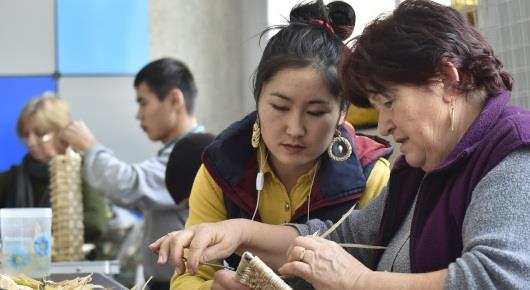Craft skills from Hungary could open new opportunities in rural Central Asia

Two groups of advanced traditional crafts masters from Hungary are in Bishkek and Tashkent, the capital cities of Kyrgyzstan and Uzbekistan, to conduct craft trainings for rural women. It’s the first such crafts training taught by Hungarian masters in Central Asia.
Commercial links between Hungary and Central Asia go back thousands of years, and perhaps that’s why, despite the thousands of kilometers between them, the two cultures share similarities.
Throughout the month of February, Hungarian masters, who use traditional crafts and skills preserved throughout the ages, will share their knowledge with workshop participants in Kyrgyzstan and Uzbekistan – mainly women coming from remote areas of the two countries.
With FAO support, the Association of Hungarian Folk Artists, in partnership with the Central Asian Crafts Support Association in Kyrgyzstan, is conducting the workshops – four each in Kyrgyzstan and Uzbekistan – to be used as modules for further replication across two countries. More than 90 local people, mostly rural women, will be trained in craftwork and then enabled to transfer their new knowledge to others.
FAO is conducting these trainings and workshops to diversify the income sources of rural populations through improved production of rural crafts and to overcome trade barriers within and outside of Central Asia.
“Our collaboration with the Hungarian masters is a cost-effective way to create a significant and sustainable source of income for rural communities in Kyrgyzstan and Uzbekistan,” said Dono Abdurazakova, the gender and social protection expert of FAO’s Regional Office for Europe and Central Asia.
“Our collaboration with the Hungarian masters is a cost-effective
way to create a significant and sustainable source of income for
rural communities in Kyrgyzstan and Uzbekistan.”
Dono Abdurazakova
Gender and social protection expert
Many Central Asian countries struggle with such developmental challenges as rural poverty, malnutrition, and rapid population growth, which puts pressure on rural infrastructure, crops, and pastures.
Agriculture itself cannot provide decent jobs to fast-growing rural populations. This forces men and women to leave their families behind and migrate to Russia or Kazakhstan in search of job and income opportunities.
Nevertheless, an assessment conducted by FAO in 2016 in Central Asia demonstrated the region’s high potential for turning traditional craftwork into profitable business, reducing labor migration and providing more opportunities for communities in rural areas. These opportunities might include, among others, wool processing, weaving, basket-making and natural dyeing.
“The expansion of the craft sector through improved skills and the development of new crafts can help rural women and men have additional sources of income using agricultural raw materials,” said Dorjee Kinlay, the FAO Representative in Kyrgyzstan, at the workshops’ opening ceremony in Bishkek.
At the workshops, the Hungarian masters teach participants to create products using traditional craft techniques and raw agricultural materials such as plants, wool and others. After the best items produced by the trainees are selected, eight artisans from Kyrgyzstan and Uzbekistan will be invited by the Hungarian Association to attend the annual Festival of Folk Arts, to be held in August in Budapest, Hungary.
12 February 2018, Bishkek, Kyrgyzstan
